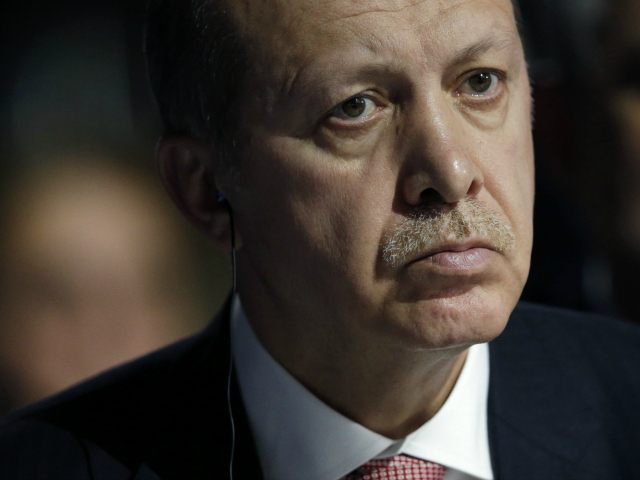Turkish President Recep Tayyip Erdogan blasted President Barack Obama’s foreign policy at a VIP dinner in Washington and charged him with supporting terrorism by backing the Kurds.
Foreign Policy reports that Erdogan believed, with some justification, that President Obama was snubbing him during his visit to Washington. Officially, the White House blamed a “scheduling issue” for President Obama’s inability to meet with Erdogan, although some sort of informal meeting may still be possible.
Erdogan attended a dinner at the St. Regis Hotel on Tuesday night, along with a number of “high-profile academics and former U.S. officials,” where Foreign Policy said the Turkish leader “ripped the American media’s coverage of his administration’s policies and bashed the White House’s support for Kurdish fighters in Syria.”
The Turks maintain Syria’s Kurds are aligned with the violent Kurdistan Workers’ Party or PKK in his own country, while the U.S. views the Kurds as indispensable allies in the battle against ISIS, essentially America’s front-line ground troops.
Although remarks at the dinner were supposed to be off the record, an anonymous attendee told Foreign Policy that Erdogan “kept coming back to that issue: Terrorists are terrorists – there are no good ones.”
This source said Erdogan “pretty much threw the Administration under the bus.”
Another source described Erdogan as “eager to compensate for Obama’s snub by speaking directly to Washington’s thought leaders about why Turkey is crucial to U.S. grand strategy and why the Obama administration is taking it for granted.”
His message during a remarkably long evening with the group of D.C. power players, according to this source, was: “You need us. You can’t win your war in Syria without us.”
Foreign Policy notes that active Obama administration officials pointedly avoided attending the dinner, perhaps in a continuing effort to express the administration’s displeasure with Erdogan’s increasingly authoritarian policies, including a crackdown on the free press. Also, there are concerns that Erdogan’s antipathy for the Kurds, and tensions with Russia, could be one element of a Turkish agenda that makes the long-sought-after “political solution” for Syria more difficult to achieve.
Erdogan is facing growing tensions in Europe, as well. The Germans were not amused by his tantrum over a satirical video. Or rather, they were somewhat amused, which is the opposite reaction to what Erdogan was shooting for when he harangued the German ambassador to Turkey and demanded the video be somehow erased from the Internet. Erdogan’s only achievement was to increase viewership of the “insulting” video by about 1,000 percent.
The New Yorker predicted Erdogan would find few allies in Washington, or the capitals of Europe, as he “marched to dictatorship in Turkey,” no matter how much assistance he offers against ISIS.
“Under normal circumstances, Erdoğan’s march to authoritarianism might be expected to provoke criticism or even economic sanctions,” the New Yorker suggests. Instead, President Obama continues to treat Erdogan as a sometimes-annoying “ally and friend,” even after he shuttered newspapers and prosecuted critics, because “the United States desperately needs Turkey, a Muslim majority country, in its fight against ISIS.”
There may also be a little embarrassment behind President Obama’s ire with Erdogan, since Erdogan was another in the long list of strongmen the president imagined as a “moderate” leader. The long view of Turkey’s diplomatic prospects might wonder if Russia’s decisive action in Syria will spell the beginning of the end for ISIS and send Turkish stock plummeting. They were late to the anti-Islamic State party, and if Erdogan keeps making himself unpalatable to Western leaders, he’ll be one of the first shown to the door when the anti-ISIS party is over.
Erdogan will nevertheless continue his charm offensive, “meeting with leaders of Jewish organizations, Turkish and American business leaders, holding an event at the Brookings Institution and speaking at a smaller working meal hosted by the Atlantic Council,” according to Foreign Policy.
Update: The Erdogan charm offensive isn’t going terribly well, as his bodyguards wound up attacking journalists and protesters assembled outside the Brookings Institute for his visit on Thursday.
Foreign Policy said one of its reporters was among those “scolded by Turkish security,” which chased one cameraman across the street.
“There were also confrontations between Turkish security and D.C. police. The Turkish officials wanted police to remove protesters, and the cops refused,” Foreign Policy added.

COMMENTS
Please let us know if you're having issues with commenting.